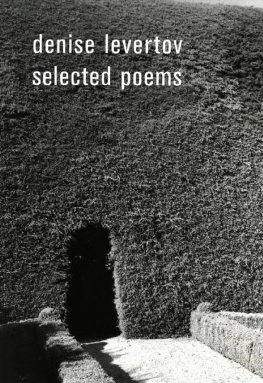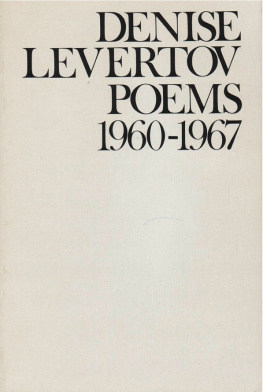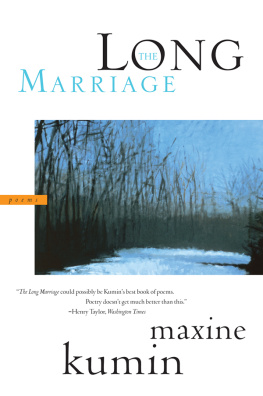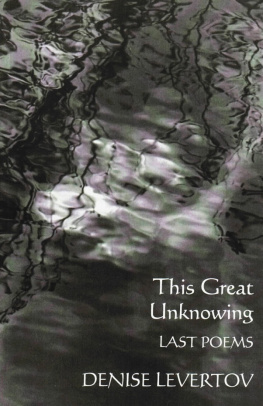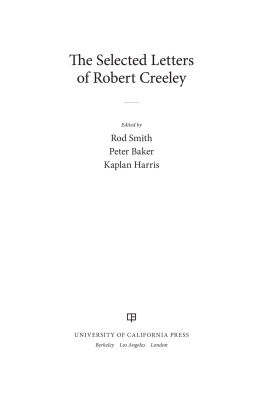Preface: Denise Levertov
Now and again it must be that someones death leaves such an emptiness among their company that the loss feels irreparable. So one might well write of Denise Levertov what she then said of her own elders in her poem September 1961 This is the year the old ones/the old great ones/leave us alone on the road.//The road leads to the sea./We have the words in our pockets, obscure directions But for us the road unfurls itself, we count the words in our pockets, we wonder how it will be without them, we dont stop walking, we know there is far to go, sometimes we think the night wind carries a smell of the sea Poets are a company and poetry must finally be a tribal art despite the fierceness of contest, which sometimes preoccupies its persons. As always they come from all manner of situation, rich and poor, near and far. It is especially dear, however, that Denise Levertov should have been born in Ilford, a suburb of London, in 1923, the youngest daughter of a Welsh mother, Beatrice Adelaide Spooner-Jones, and a Russian immigrant Jewish scholar converted to Anglicanism, Paul Philip Levertoff. Even more interesting is the fact that she never had formal education but was tutored at home by her parents, while otherwise an active apprentice dancer at Sadlers Wells. Her adolescence ends in the bleak chaos of the Second World War with its devastating bombings of London, during which time she serves as a civilian nurse in various hospitals.
Just after the wars end she met her husband-to-be, the American writer Mitchell Goodman, at a youth hostel in Switzerland. This chance encounter changed everything, bringing her thereby to live in this country and so to become the singular and profoundly defining poet of our own time and place. There is neither reason nor need to rehearse now the details of her many books or of the years spent as a decisive teacher at universities such as Tufts, Brandeis, or Stanfordnor even to review her unremitting political activities, so committed to confronting the despairs of our common world. Better now to remember the intensely human presence, the vivid rapport she has with the aging Williams, the impression she first makes on Kenneth Rexroth, causing him to call her Dantes Beatrice incarnate, the way she manages to acclimate and then to find her necessary world. Who can ever forget her, who saw her just thenthe extraordinary, utterly beautiful energy, the compact, physical strength of movementall of which became manifest of her art? Her husband, Mitch, was my old classmate and so I knew Denise in those moving, early days. Their young family visited our makeshift home in New Hampshire and later I became in turn their frequent, almost awkward guest in New York.
But most significant was the year we spent as neighbors in the south of France, where she and I would spend hours sitting at the edge of their orchard in Puyricard. We talked as only the young canof our master Williams line, of how to locate stress, how to measure, to keep the physical fact of sound and rhythm explicit. I recall one time we were all to cycle into Aix for a performance of Mozart, down the steep route alongside Mt. Sainte-Victoire, where Czanne once had his studio. The road went through the wheat fields of various farmers, whose fierce, bad-tempered dogs came snarling after us as we pedaled past, racing for our lives. The evening, however, it was the sudden failure of Denises brakes, which almost proved disastrous.
One moment she was beside us, the next she was gathering speed and outdistancing us as her bike hurtled forward and then out of sight, around a bend. We tried to keep up but she was goneand so we made our way down, fearful of the apparent outcome. But once there, she suddenly reappeared, having shot all through the citys early evening traffic to the far side where an incline let her finally come to a stop. Amazingly I think that was that, and we went on to the concert without further comment. If one wanted to say what it was seemed most insistent in either her work or her person, it would bealways for methe fact of body, the immediacy of that presence in all she wrote or was. Her friends will forever remember the wild gutsy chuckling, the giggling bursts of delight, that were such pleasure to witness.
She moved always to the physical term, call itand probably she herself puts it most simply in a characteristic line: If were going to be here, lets be here now She was, always. The exceptional gracea dancers, I liked to thinkof her work, the movement so particular to a complex of thought and feeling, accomplished a rare unity. That quality is present in all she does, whether in the early poems of marriage, friends and family, or else those later of an increasing outrage and despair as the general world in which she lives sinks more deeply into war and righteous judgment. There is no one who writes more particularly of what being a woman constitutes. Hypocrite Women, Losing Track, The Ache of Marriage, Stepping Westwardso many. Here it was that her powers first gathered and declared themselves, unequivocally forthright and particular.
Her old and constant friend Robert Duncan, despite their late questions of one another, best defines the character of responsibility which was Denises: Responsibility is the ability to respond. Hers was impeccablein all respects, in all reference. She had a way of seeing the world that was perhaps without a usual shading. But what use the endless accommodation, the temporizing, the irresolution? She would have none o it, even less as she grew older. People could not be brutalized and murdered while we waited, still patient, to understand. In the very last years she became a Catholic, and I wondered about that for my own reasons, curious that she should, as a woman, accept the situation of that belief.
Very probably I missed the point entirelyand presumed that her choice was among possibilities, whereas I now see it was to come into a company, a gathering of all, a determined yielding of such distinction and isolating privilege, which may well have persuaded her. I miss her very muchas I am sure all must who knew her in whatever waywho read her extraordinary poems or heard her read them with such melodious clarity and precision. I depended upon her integrity, that she was dogged, determined, flooded with purpose. Because a moment later her wit was like a sudden ripple, a streak of sunlight, the chitter of some hidden bird. One was so thankful that she was there. Her heart was so much herself, so literal.
She was a great and abiding poet, a wonderfully explicit human. One will not forget how much she cared for life , our lives, as people, the world forever the one in which we all must finally learn to live while we can. R OBERT C REELEY (Originally an address tothe American Academy of Arts and Letters,in 1998, in honor of the life and workof Denise Levertov)
denise levertov
selected poems
Listening to Distant Drums
The roses tremble; oh, the sunflowers eye Is opened wide in sad expectancy. Westward and back the circling swallows fly, The rooks battalions dwindle near the hill. That low pulsation in the east is war: No bell now breaks the evenings silent dream.
Childhood's End
The world alive with love, where leaves tremble, systole and diastole marking miraculous hours, is burning round the children where they lie deep in caressing grasses all the day, and feverish words of once upon a time assail their hearts with languor and with swans.
Childhood's End
The world alive with love, where leaves tremble, systole and diastole marking miraculous hours, is burning round the children where they lie deep in caressing grasses all the day, and feverish words of once upon a time assail their hearts with languor and with swans.

